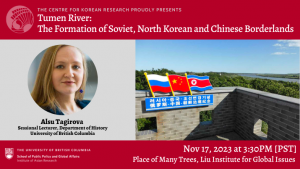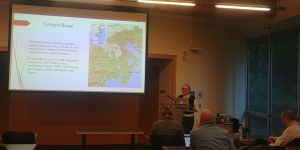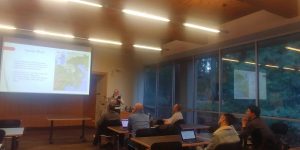- Title: Tumen River: The Formation of Soviet, North Korean and Chinese Borderlands



- Date: Friday, Nov 17th, 2023
- Time: 3:30-5:00PM (PST)
- Location: Place of Many Trees, Room 130, UBC Liu Institute for Global Issues
- Speaker: Dr. Alsu Tagirova (Sessional Lecturer, Department of History at University of British Columbia)
- Bio: Alsu Tagirova is Research Fellow at the Academy of History and Documentation of Socialism, East China Normal University, Shanghai. She is currently a Visiting Scholar in the Department of History at Simon Fraser University. Her research interests include the History of Sino-Soviet relations, Korean Peninsula, and Central Asia. Her articles appeared in Asian Perspective, Cold War History, Journal of Cold War Studies, Nationalities Papers, Central Asian Survey, etc.
- Abstract: The USSR did not have a state border with North Korea until 1985, although the actual border between them, passing through the Tumen River, was de facto recognized and observed. The Sino-Russian treaties of the 19th century only indirectly mentioned the Russian-Korean border. With the establishment of the DPRK in 1948, these treaties could no longer remain the basis for the delimitation of the border with Korea, new agreement had to be signed. The 1957 Soviet-North Korean Convention on the Procedure for Solving Frontier Issues covered the section of the Tumen River from the tripoint of the USSR, PRC, and DPRK borders to the confluence of the river into the Sea of Japan. Nevertheless, it did not determine the exact location of the borderline, thus rendering the work of borderguards a complicated issue. Only in November 1984, did the two deputy foreign ministers initial a bilateral border agreement. Notably, the resolution of the USSR-DPRK border issue came long before the Sino-Soviet 1991 border agreement and much later than the 1962 Sino-North Korean border agreement. The paper argues that the Soviet-North Korean border issue was always used as a bargaining chip by the North Koreans in an attempt to fulfill greater strategic goals.